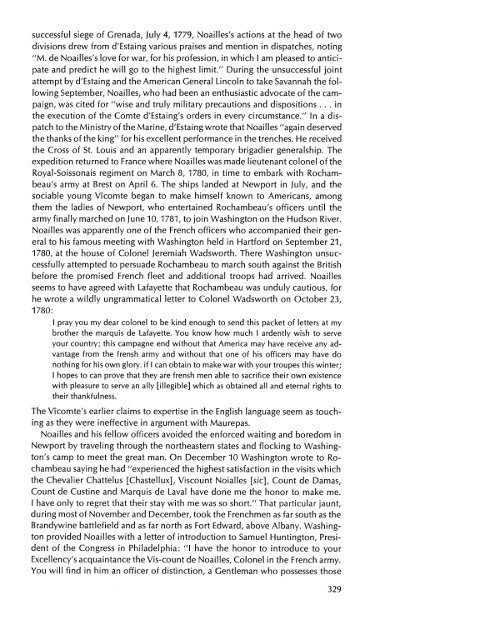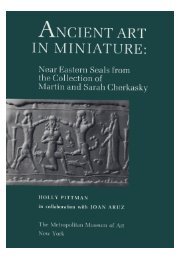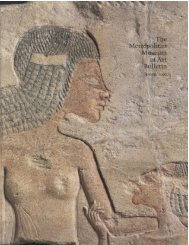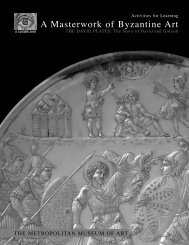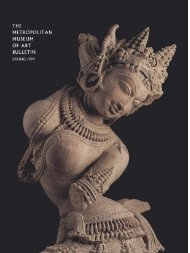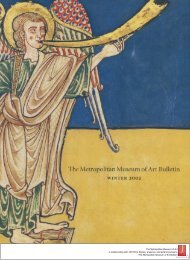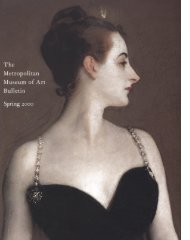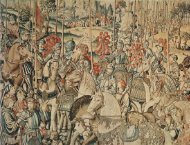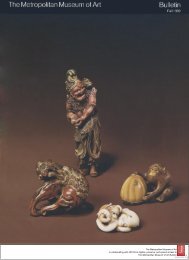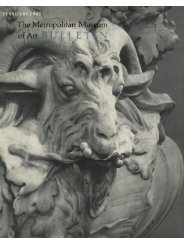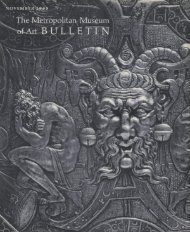The Metropolitan Museum of Art Bulletin, v. 29, no. 7 (March, 1971)
The Metropolitan Museum of Art Bulletin, v. 29, no. 7 (March, 1971)
The Metropolitan Museum of Art Bulletin, v. 29, no. 7 (March, 1971)
You also want an ePaper? Increase the reach of your titles
YUMPU automatically turns print PDFs into web optimized ePapers that Google loves.
successful siege <strong>of</strong> Grenada, July 4, 1779, Noailles's actions at the head <strong>of</strong> two<br />
divisions drew from d'Estaing various praises and mention in dispatches, <strong>no</strong>ting<br />
"M. de Noailles's love for war, for his pr<strong>of</strong>ession, in which I am pleased to anticipate<br />
and predict he will go to the highest limit." During the unsuccessful joint<br />
attempt by d'Estaing and the American General Lincoln to take Savannah the following<br />
September, Noailles, who had been an enthusiastic advocate <strong>of</strong> the campaign,<br />
was cited for "wise and truly military precautions and dispositions ... in<br />
the execution <strong>of</strong> the Comte d'Estaing's orders in every circumstance." In a dispatch<br />
to the Ministry <strong>of</strong> the Marine, d'Estaing wrote that Noailles "again deserved<br />
the thanks <strong>of</strong> the king" for his excellent performance in the trenches. He received<br />
the Cross <strong>of</strong> St. Louis and an apparently temporary brigadier generalship. <strong>The</strong><br />
expedition returned to France where Noailles was made lieutenant colonel <strong>of</strong> the<br />
Royal-Soissonais regiment on <strong>March</strong> 8, 1780, in time to embark with Rochambeau's<br />
army at Brest on April 6. <strong>The</strong> ships landed at Newport in July, and the<br />
sociable young Vicomte began to make himself k<strong>no</strong>wn to Americans, among<br />
them the ladies <strong>of</strong> Newport, who entertained Rochambeau's <strong>of</strong>ficers until the<br />
army finally marched on June 10, 1781, to join Washington on the Hudson River.<br />
Noailles was apparently one <strong>of</strong> the French <strong>of</strong>ficers who accompanied their general<br />
to his famous meeting with Washington held in Hartford on September 21,<br />
1780, at the house <strong>of</strong> Colonel Jeremiah Wadsworth. <strong>The</strong>re Washington unsuccessfully<br />
attempted to persuade Rochambeau to march south against the British<br />
before the promised French fleet and additional troops had arrived. Noailles<br />
seems to have agreed with Lafayette that Rochambeau was unduly cautious, for<br />
he wrote a wildly ungrammatical letter to Colonel Wadsworth on October 23,<br />
1780:<br />
I pray you my dear colonel to be kind e<strong>no</strong>ugh to send this packet <strong>of</strong> letters at my<br />
brother the marquis de Lafayette. You k<strong>no</strong>w how much I ardently wish to serve<br />
your country; this campagne end without that America may have receive any advantage<br />
from the frensh army and without that one <strong>of</strong> his <strong>of</strong>ficers may have do<br />
<strong>no</strong>thing for his own glory. if I can obtain to make war with your troupes this winter;<br />
I hopes to can prove that they are frensh men able to sacrifice their own existence<br />
with pleasure to serve an ally [illegible] which as obtained all and eternal rights to<br />
their thankfulness.<br />
<strong>The</strong> Vicomte's earlier claims to expertise in the English language seem as touching<br />
as they were ineffective in argument with Maurepas.<br />
Noailles and his fellow <strong>of</strong>ficers avoided the enforced waiting and boredom in<br />
Newport by traveling through the <strong>no</strong>rtheastern states and flocking to Washington's<br />
camp to meet the great man. On December 10 Washington wrote to Rochambeau<br />
saying he had "experienced the highest satisfaction in the visits which<br />
the Chevalier Chattelus [Chastellux], Viscount Noialles [sic], Count de Damas,<br />
Count de Custine and Marquis de Laval have done me the ho<strong>no</strong>r to make me.<br />
I have only to regret that their stay with me was so short." That particular jaunt,<br />
during most <strong>of</strong> November and December, took the Frenchmen as far south as the<br />
Brandywine battlefield and as far <strong>no</strong>rth as Fort Edward, above Albany. Washington<br />
provided Noailles with a letter <strong>of</strong> introduction to Samuel Huntington, President<br />
<strong>of</strong> the Congress in Philadelphia: "I have the ho<strong>no</strong>r to introduce to your<br />
Excellency's acquaintance the Vis-count de Noailles, Colonel in the French army.<br />
You will find in him an <strong>of</strong>ficer <strong>of</strong> distinction, a Gentleman who possesses those<br />
3<strong>29</strong>


